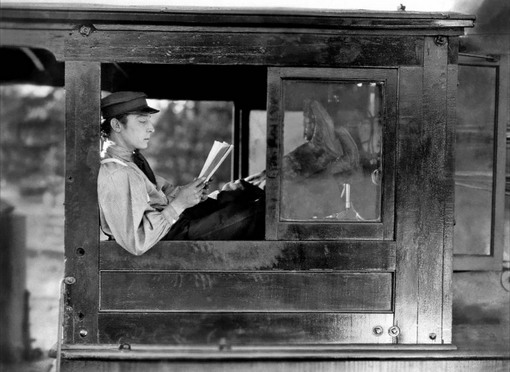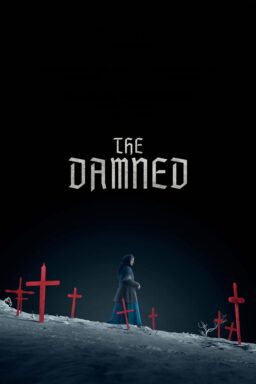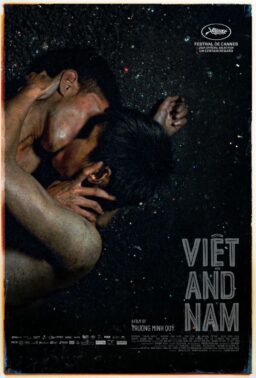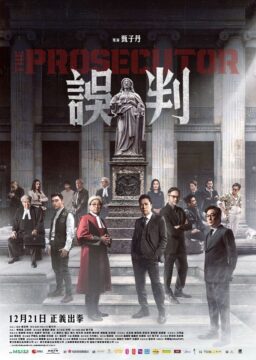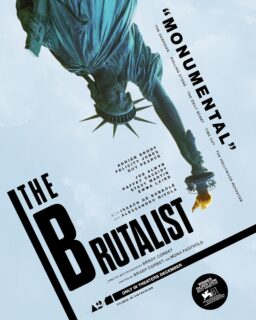The big loser in the 2012 Sight & Sound critics poll is… funny. OK, we know there are no losers, only winners! But, still, with the obvious exceptions of “Citizen Kane” and “Rules of the Game,” this decade’s consensus choices for the Greatest Films of All Time are not a whole lotta laughs, even though they’re terrific motion pictures. There’s not much in the way of chuckles or joie de vivre to be found in “Vertigo,” “Tokyo Story,” “Man with a Movie Camera,” “The Searchers,” “The Passion of Joan of Arc“… At least “Sunrise,” “2001: A Space Odyssey” and “8 1/2” have healthy senses of humor, but “Kane” and “Rules of the Game” are the only movies in the top 10 with the propulsive vitality of (screwball) comedy. They are flat-out fun (even if they are regarded as “classics”). And with “Kane” bumped to #2 this time, The List has become, to paraphrase a great comedy from the 1980s, one less funny.
I say this as someone who believes that comedy is everything, and that drama is lifeless (or at least emotionally stunted) without it. Some might argue that comedy without drama is also limited and superficial, but I think comedy is more profound and complex — and more difficult to pull off successfully. I can name plenty of comedies that capture a mature vision of human existence (if you’re into that kind of thing — like all of Buster Keaton), but a drama that (artificially) excludes humor is feels false and inert to me. [No, I’m not saying the other movies in the Top Ten are humorless or lack cinematic exuberance; just that their energy is not primarily comedic, as i feel Welles’ and Renoir’s are. To some extent, I’m talking about the overall tendency to value “seriousness” above “humor” in these sorts of exercises.] As for the 2012 Sight & Sound Top Ten, compare it with 1982 (“Singin' in the Rain,” “The General”), 1992 (“L’Atlante”) and 2002 (“Singin’ in the Rain”). The lack of comedy on the new list hearkens back to the Somber Ol’ Days of the 1950s, ’60s and ’70s. As somebody once said: Why so serious?
There is no movie I love more than “Vertigo” (or “Kane” — once you reach a certain threshold, such distinctions are meaningless), which is not only one of the great films but one of the great color films, in particular. Its palette is rich, expressive, poetic — as is the color in “2001” and “The Searchers,” but Hitchcock is working on even more sophisticated and psychologically intricate levels.
I’m a little surprised — given the massive influx of younger bloggers and Internet critics — that this decade’s list is, if anything, possibly more staid and conservative than the last few. The only film appearing in the Top Ten for the first time is “Man with a Movie Camera” — from 1929. All the others are titles familiar from the poll results of the last 20-30 years.
Bigger news than the spot-swapping of “Kane” and “Vertigo,” I think, is the absence of Sergei Eisenstein’s “Battleship Potemkin” from the Top 10 (OK, it’s #11) for the first time in the history of the poll. Now that is an old warhorse of a picture (I don’t know many who actually like to watch it) and I, for one, am happy to see Soviet montage placed on the historical back-burner at last, supplanted in the cinematic heavens by the greater glories of mise en scène (Welles, Renoir, Murnau, Fellini, Kubrick, Ford, et al.)
As expected, there’s nothing particularly obscure on the consensus list — at least nothing that would be considered so in mainstream movie-critic circles. Personally, I sensed a certain vogue in recent years for Vertov (“Man with a Movie Camera”), “Jeanne Dielmann” (Chantal Akerman, 1975 — Criterion disc release, 2009), “PlayTime” (Jacques Tati, 1967 — Criterion re-release, 2006), ” the nine-hour “Shoah” (Claude Lanzmann, 1985 — IFC 25th anniversary theatrical re-release, 2010 — Region 2 DVD, 2010) and the seven-and-a-half-hour “Satantango” (Bela Tarr, 1994 — Region 1 DVD, 2008) and the eight-part “Histoire(s) du cinéma” (Jean-Luc Godard, 1988-1998 — Region 1 DVD, 2011), all of which made the critics’ Top 50; and for “Celine and Julie Go Boating” (Jacques Rivette, 1974 — Region 2 DVD), which didn’t. I’m making no judgments at all about these films’ worthiness, just noting that, after not hearing much about them for a while (largely because they were not often screened in the U.S.), there seemed to be more of a buzz about them in the last few years.
I’m very glad that critics aren’t simply glomming onto films and filmmakers because they are “new.” Yes, we know these lists are kind of silly (what are the 50 Greatest Paintings of All Time?), and there are only so many slots available, but it’s healthy to remember that a great movie remains a great movie, no matter when it was made. Still, I’m a little bit surprised not to see Robert Altman, Roman Polanski, Sam Peckinpah, Joel & Ethan Coen, Eric Rohmer, Wim Wenders, Steven Spielberg or Krzystof Kieslowski in the Top 50 — or, among the established pantheon directors, Howard Hawks, Luis Buñuel, Max Ophuls, Ernst Lubitsch, Josef von Sternberg, Preston Sturges or American films by Fritz Lang, to name a few. Most of these directors have a number of masterpieces to their name, so maybe (as is often the case in these contests) the votes were split among too many titles.
In my initial notes on the list (published within minutes of its Twittered appearance via @SightSoundMag), I made note of the critics’ most popular directors:
Jean-Luc Godard (“Breathless,” “Contempt,” “Pierrot le fou,” “Histoire(s) du cinema”).
Carl Theodor Dreyer (“The Passion of Joan of Arc,” “Ordet,” “Gertrud”)
Ingmar Bergman (“Persona,” “Wild Strawberries,” “Fanny and Alexander,” “The Seventh Seal“)
Francis Ford Coppola (“Apocalypse Now,” “The Godfather,” “The Godfather Part II”)
Andrei Tarkovsky (“Andrei Rublev,” “Mirror,” “Stalker”)
Directors making it into the Top 50 for (I believe) the first time:
Wong Kar-Wai (“In the Mood for Love,” 2000)
David Lynch (“Mulholland Drive,” 2001)
Abbas Kiarostami (“Close Up,” 1990)
Chris Marker (La Jetee, 1962)
Films that have been on the critics’ Top Ten the most times since 1952:
“Rules of the Game” (all 7)
“Citizen Kane” (6: 1962, 1972, 1982, 1992, 2002, 2012)
“Battleship Potemkin” (6: 1952, 1962, 1972, 1982, 1992, 2002)
“Vertigo” (4: 1982, 1992, 2002, 2012)
“The Passion of Joan of Arc” (4: 1952, 1972, 1992, 2012)
“8 1/2” (4: 1972, 1982, 2002, 2012)
“The Searchers” (3: 1982, 1992, 2012)
“2001: A Space Odyssey” (3: 1992, 2002, 2012)
“Tokyo Story” (3: 1992, 2002, 2012)
And one more thought about Orson Welles: “Citizen Kane,” “The Magnificent Ambersons,” “The Lady from Shanghai,” “Macbeth,” “Touch of Evil,” “The Trial,” “Chimes at Midnight,” “F for Fake“… To paraphrase Jean-Luc Godard: “The cinema is Orson Welles.” And always will be.
– – – – –
The Sight & Sound Top Tens:
1952
1. Bicycle Thieves (De Sica)
2. City Lights (Chaplin)
2. The Gold Rush (Chaplin)
4. Battleship Potemkin (Eisenstein)
5. Intolerance (Griffith)
5. Louisiana Story (Flaherty)
7. Greed (von Stroheim)
7. Le Jour se lève (Carné)
7. The Passion of Joan of Arc (Dreyer)
10. Brief Encounter (Lean)
10. La Règle du jeu (Renoir)
1962
1. Citizen Kane (Welles)
2. L’avventura (Antonioni)
3. La Règle du jeu (Renoir)
4. Greed (von Stroheim)
4. Ugetsu Monogatari (Mizoguchi)
6. Battleship Potemkin (Eisenstein)
7. Bicycle Thieves (De Sica)
7. Ivan the Terrible (Eisenstein)
9. La terra trema (Visconti)
10. L’Atalante (Vigo)
1972
1. Citizen Kane (Welles)
2. La Règle du jeu (Renoir)
3. Battleship Potemkin (Eisenstein)
4. 8½ (Fellini)
5. L’avventura (Antonioni)
5. Persona (Bergman)
7. The Passion of Joan of Arc (Dreyer)
8. The General (Keaton)
8. The Magnificent Ambersons (Welles)
10. Ugetsu Monogatari (Mizoguchi)
10. Wild Strawberries (Bergman)
1982
1. “Citizen Kane” (Welles)
2. “La Règle du jeu” (Renoir)
3. “Seven Samurai” (Kurosawa)
3. “Singin’ in the Rain” (Kelly, Donen)
5. “8½” (Fellini)
6. “Battleship Potemkin” (Eisenstein)
7. “L’avventura” (Antonioni)
7. “The Magnificent Ambersons” (Welles)
7. “Vertigo” (Hitchcock)
10. “The General” (Keaton)
10. “The Searchers” (Ford)
1992
1. “Citizen Kane” (Welles)
2. “La Regle du Jeu” (Renoir)
3. “Tokyo Story” (Ozu)
4. “Vertigo” (Hitchcock)
5. “The Searchers” (Ford)
6. “L'Atalante” (Vigo)
6. “The Passion of Joan of Arc” (Dreyer)
6. “Pather Panchali” (Ray)
6. “Battleship Potemkin” (Eisenstein)
10. “2001: A Space Odyssey” (Kubrick)
2002
1. “Citizen Kane” (Welles)
2. “Vertigo” (Hitchcock)
3. “Rules of the Game” (Renoir)
4. “The Godfather” / “The Godfather Part II” (Coppola)
5. “Tokyo Story” (Ozu)
6. “2001: A Space Odyssey” (Kubrick)
7. “Battleship Potemkin” (Eisenstein)
8. “Sunrise” (Murnau)
9. “8 1/2” (Fellini)
10. “Singin’ in the Rain” (Donen/Kelly)
2012
1) “Vertigo” (Alfred Hitchcock, 1958)
2) “Citizen Kane” (Orson Welles, 1941)
3) “Tokyo Story” (Yasujiro Ozo, 1953)
4) “Rules of the Game” (Jean Renoir, 1939)
5) “Sunrise” (F.W. Murnau, 1927)
6) “2001: A Space Odyssey” (Stanley Kubrick, 1968)
7) “The Searchers” (John Ford, 1956)
8) “Man with a Movie Camera” (Dziga Vertov, 1929)
9) “The Passion of Joan of Arc” (Carl Theodor Dreyer, 1928)
10) “8 1/2” (Federico Fellini, 1963)

